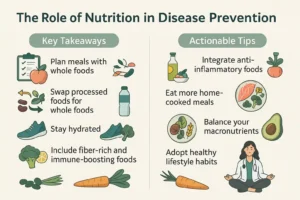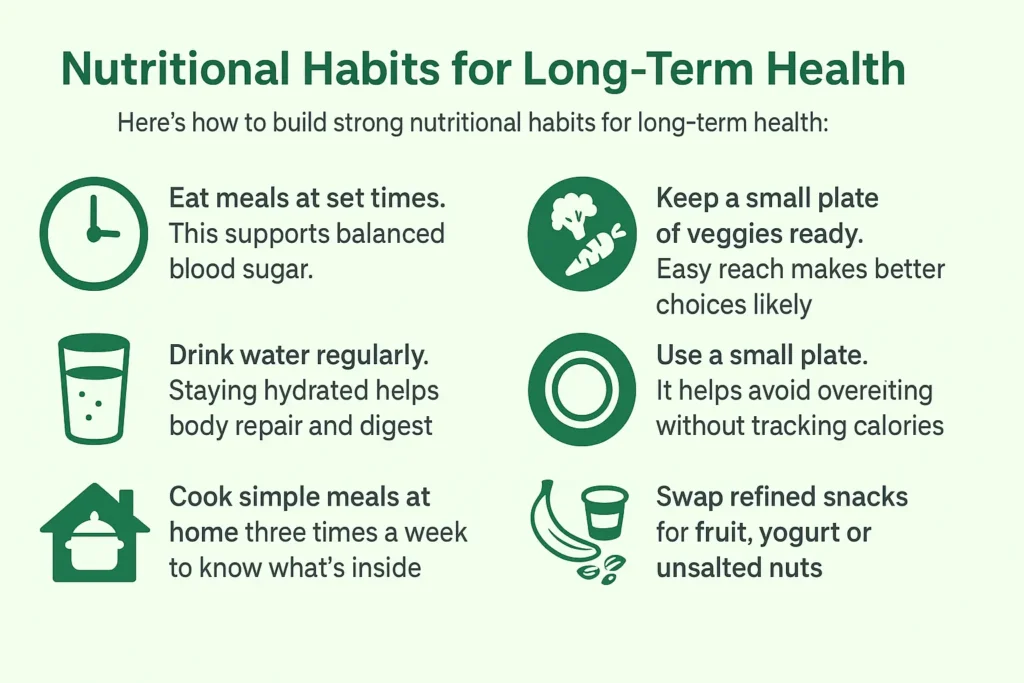Key Takeaways
- The role of nutrition in disease prevention starts with daily food habits.
- Good food choices can help in disease control and prevention.
- Simple dietary changes reduce your risk of heart problems, diabetes, cancer, and more.
- Eating whole foods, rich in nutrients, helps your body fight off illness.
- A healthy diet works best when matched with smart lifestyle habits.
Nutrition and Disease Prevention
Nutrition and disease prevention are directly linked. Food fuels your body. But it’s more than just energy. It shapes how your cells grow, how your organs work, and how your immune system fights off germs.
If your nutrition is inadequate, your body is at a higher risk of falling ill. When you eat right, your body works better and fights illness better. This is why the role of nutrition in disease prevention should never be ignored.
Poor food choices often lead to lifestyle diseases like obesity, heart issues, or high blood pressure. These issues do not simply occur; they accumulate gradually over time. And the trigger is often bad eating.
Disease Prevention through Diet

You don’t need fancy superfoods to stay healthy. What you need is smart, balanced eating.
Eating fruits, vegetables, whole grains, lean protein, and healthy fats gives your body disease‑fighting nutrients. These essential nutrients contribute to reducing the likelihood of heart disease, diabetes, cancer, and obesity.
A balanced diet for health helps control blood pressure and sugar. This kind of diet drives chronic disease prevention.
Simple food changes work: swap sugary drinks for water, add fiber‑rich beans, cut processed meats. That is how nutrition contributes to the development of disease resistance.
Nutrition Strategies for Wellness
To boost your body, focus on real food. Use nutritional strategies that are easy and effective:
- Choose whole foods diet: fruits, vegetables, whole grains, beans, nuts, seeds.
- Eat micronutrient‑rich foods like leafy greens, berries, and lean protein.
- Follow an anti‑inflammatory diet: limit processed food, sugar and red meat; enjoy olive oil, fish, nuts.
- Use plant‑based nutrition often: plants give fiber, vitamins and antioxidants that protect your body.
- Include immune-boosting foods such as leafy greens, yogurt, almonds, seeds, and citrus.
By sticking to these nutritional strategies, you make daily meals work for your health. You feel more energy and reduce sickness risk.
Nutritional Habits for Long-Term Health

Food is not a short-term fix. You need nutritional habits that stick for years. This means building good food choices into your routine.
Here’s how to build strong nutritional habits for long‑term health:
- Eat meals at set times. This supports balanced blood sugar.
- Keep a small plate of veggies ready. Easy reach makes better choices likely.
- Drink water regularly. Staying hydrated helps body repair and digest.
- Use a small plate. It helps avoid overeating without tracking calories.
- Cook simple meals at home three times a week to know what’s inside.
- Swap refined snacks for fruit, yogurt or unsalted nuts.
These habits build a lifestyle that stays with you. When you stick to good nutritional habits, your body fights disease easier and keeps working at its best.
This supports disease control and prevention every day.
Prevent These Diseases Through Proper Nutrition
The role of nutrition plays out clearly in disease risks.
Here’s how food helps lower your risk:
| Disease | What Helps |
| Heart Disease | Low-fat meals, high fiber, fruits, whole foods diet |
| Diabetes | Less sugar, more fiber, healthy carbs |
| Cancer | Anti-inflammatory diet, more veggies, less processed meat |
| High Blood Pressure | Less salt, more potassium, DASH diet benefits |
| Obesity | Balanced meals, less junk food, plant-based nutrition |
Each of these links shows how the importance of nutrition in health is tied to lower risk and better living.
Preventive Nutrition Tips for Everyday Life
Here are clear, useful tips guided by importance of nutrition in health and preventive nutrition:
- Plan meals with fruit, vegetables, protein, grain and healthy fat.
- Choose brown rice or oats, not white versions.
- Use olive oil instead of butter or palm oil.
- Snack on raw nuts or fruit.
- Replace soda with water or herbal tea.
- Enjoy fish or beans for protein two or three times weekly.
- Cook at home more and avoid packaged snacks.
These tips turn nutritional habits into habits that reduce heart problems, diabetes prevention through diet and weight gain risks. These steps support diet and health and lasting disease safety.
Dietary Approaches to Reduce Disease Risk
Certain diet plans help more than others:
- The DASH diet benefits include lower blood pressure by using low‑salt meals, high potassium foods like leafy greens, and lean protein.
- A whole foods diet based on plants, whole grains, nuts, seeds, beans, and lean fish helps reduce heart and diabetes risks.
- The Mediterranean diet, rich in olive oil, vegetables, fish, legumes, whole grains, shows strong evidence of reducing obesity, hypertension, and cancer risks.
- Low‑fat plant‑based plans like the Pritikin or Ornish diets help reverse heart damage and control cholesterol.
These dietary styles show how the role of nutrition in disease prevention works—by using food smartly to reduce illness risks in real life.
Lifestyle Changes Beyond Diet for Disease Prevention
Eating right is powerful, but it’s not the only thing.
Pair your healthy food habits with:
- Regular walks or exercise
- 7 to 8 hours of sleep
- Stress relief methods like breathing or stretching
- Less screen time, more outdoor time
- No smoking or heavy drinking
This creates a full health-conscious lifestyle. Together, these actions raise your chances of staying well and avoiding lifestyle diseases.
Healthy Eating: A Key to Lifelong Wellness
Healthy food is more than just fuel. It’s a shield. It builds a stronger body, supports mental clarity, and boosts energy. It protects your heart, brain, and gut.
This is why nutrition and disease must be talked about together. The link is strong. You can avoid many illnesses by simply eating right, every day.
Eating well also improves your mood and focus. You sleep better. You move better. You think better.
Conclusion: Shaping a Healthier Future through Nutrition
You are responsible for your health’s future.
The role of nutrition in disease prevention is clear, strong, and backed by years of science. Good food choices today can stop serious problems tomorrow.
When you understand the importance of nutrition, you stop seeing food as just fuel. You see it as power. Power to heal, stay well, and power to live longer with fewer doctor visits.
So make each bite count.
FAQs About Preventive Health
What nutrients prevent disease?
Vitamins (A, C, D), minerals like zinc and iron, fiber and antioxidants help your body defend and heal.
What is the relationship between nutrition and disease?
Food affects inflammation, immunity, and organ function. Good nutrition lowers risk; poor nutrition raises disease chances.
Which nutrition protects us from diseases?
Micronutrient‑rich foods and whole plant‑based meals full of antioxidants and fiber support disease defense.
How does nutrition help in preventing chronic diseases?
It balances blood sugar, shields heart and blood pressure, and supports weight control to cut chronic disease risk.
Can diet really reduce the risk of cancer or heart disease?
Yes. Many studies link diets with vegetables, whole grains and lean protein to lower risk of heart and cancer.
What is the most effective diet for disease prevention?
A whole foods diet rich in plant foods, lower in processed items, shows strong results in lowering disease risk.
Is it better to take supplements or get nutrients from food?
Eating whole food gives a mix of nutrients, fiber and compounds. Supplements help only when needed or lacking.
How important is hydration in disease prevention?
Hydration removes waste, aids digestion, helps blood flow and supports your immune system.
Can healthy eating reverse existing health conditions?
Yes. Nutritional therapy paired with lifestyle change can improve or sometimes reverse chronic conditions.
How does poor nutrition affect the immune system?
It weakens body repair, slows healing, and lowers defense cells. That increases the chance of infections and slow recovery.















Leave a Comment